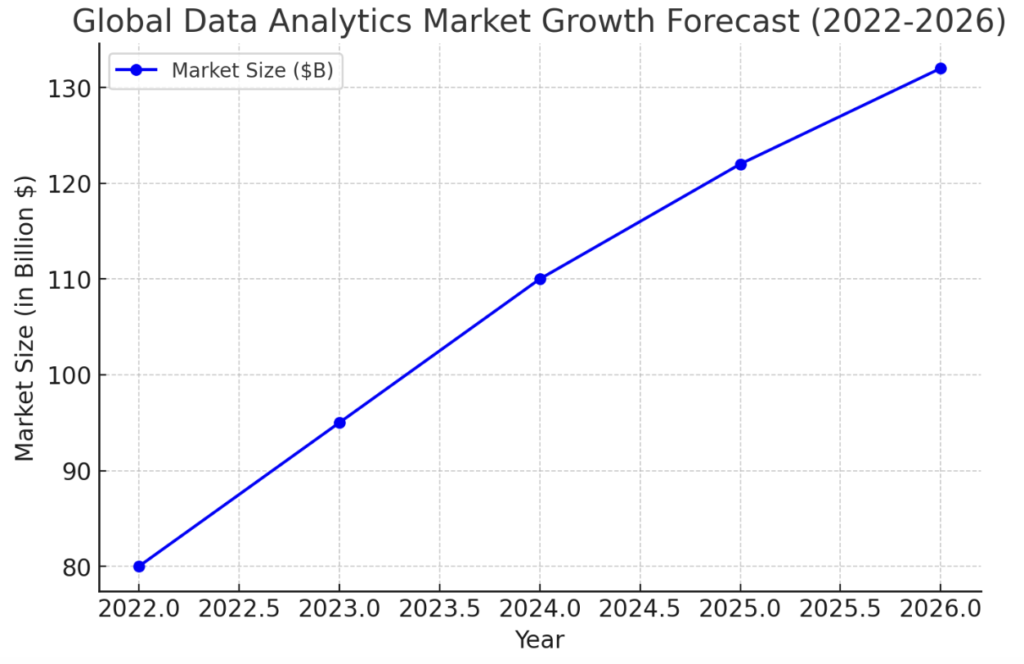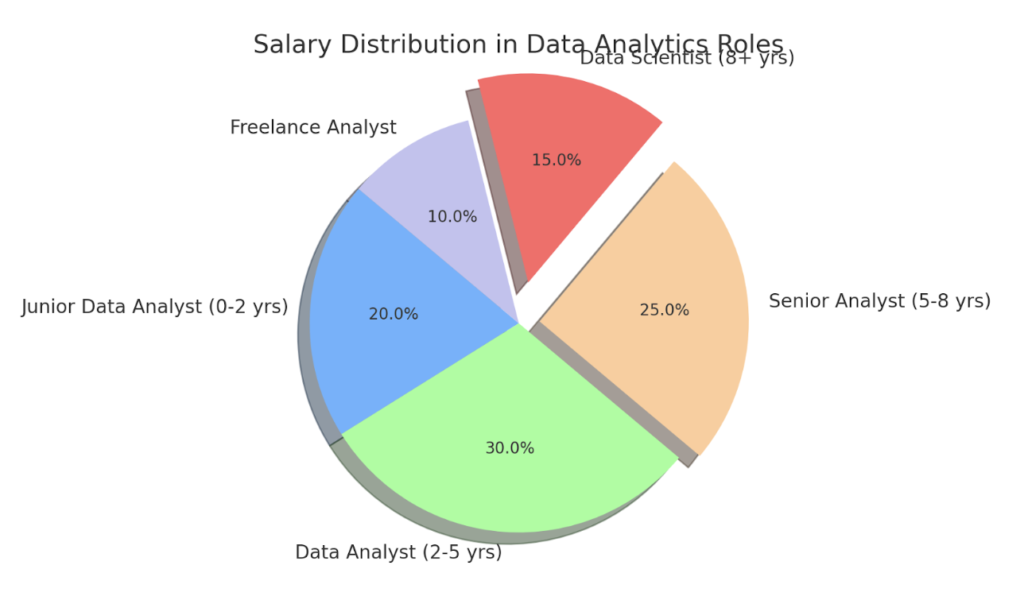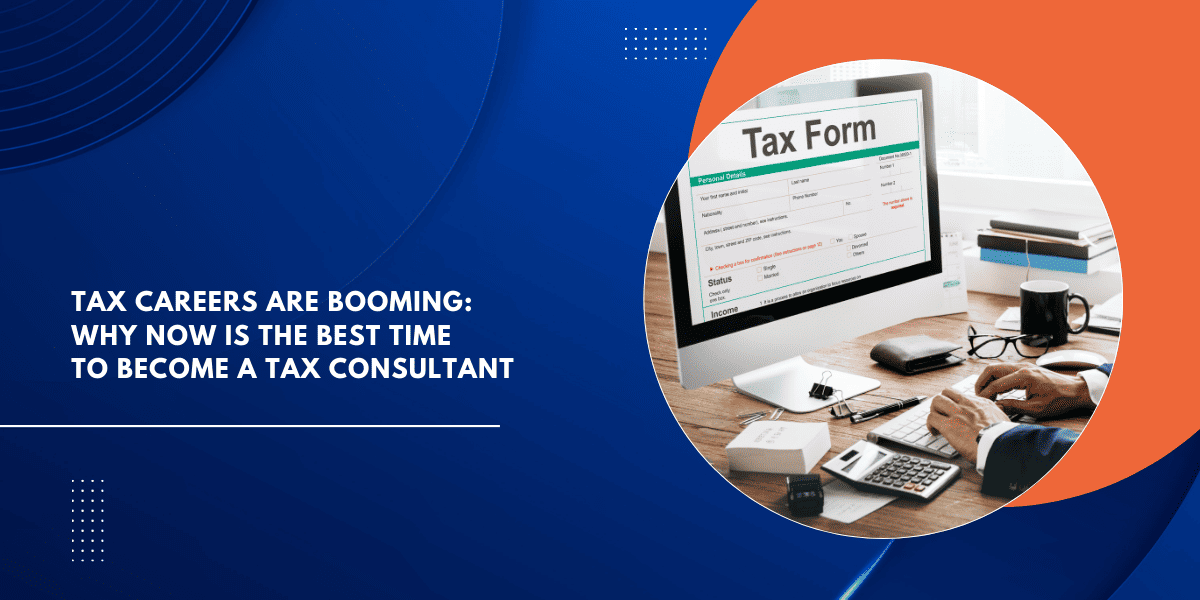Introduction: Why This Career Matters Today?
Have you ever wondered how companies like Google, Amazon, and Netflix make such accurate recommendations? The secret lies in data analytics. Today, data analytics is crucial in almost every field.
Nearly every industry now relies on data-driven decision-making to stay competitive. For example, what do self-driving cars, personalized ads, and fraud detection have in common? They all depend on data analytics and emerging trends. In fact, it’s hard to imagine the present or future without data.
And here’s the best part—you don’t need to be a math or statistics expert to understand and apply data analytics effectively. From my experience, I can say that data analytics is no longer just a niche skill reserved for people with exceptional technical and computational abilities. I’ve noticed that data analytics has now evolved into a key business function, influencing strategic decisions in almost every industry.
Take the case of Raghav Chandran, an English Honors graduate from Bangalore. He previously worked as a marketing professional at a reputed company but later transitioned into data analytics. With no background in programming or advanced mathematics, he started with online courses in SQL, Python, and data visualization. Within a year, he landed a role as a Data Analyst at a fintech company, where he now helps businesses make data-driven decisions.
Raghav’s story proves that anyone with curiosity and a willingness to learn can break into this field—regardless of their previous experience.
The same goes for Pooja from Hyderabad. She completed her bachelor’s degree in commerce but soon realized that her true passion was extracting insights from raw data. Determined to switch careers, she enrolled in online data analytics programs and later secured a job in the field.
If you have a passion for working with data, this career path is for you.
Similarly, I recently mentored a finance professional who transitioned into data analytics. Within a year, he significantly boosted his team’s decision-making using data-driven insights, leading to a 15% increase in profitability.
I could share many more examples, as I personally know students who are now excelling in data analytics—despite coming from non-mathematics backgrounds. This clearly proves that data analytics is an accessible and rewarding career option for anyone willing to learn.

Is Data Analyst a Good Career?
Today, businesses of all sizes rely on data insights to enhance efficiency, improve customer experiences, and gain a competitive edge, making data analytics an essential skill for professionals across various domains.
Whether you’re in finance, healthcare, marketing, IT, or even entertainment, the ability to interpret data gives you a competitive edge. With proper training and practice, you can learn to analyze data and derive meaningful insights. And you can start your career as a data analyst right from today. I personally feel that if you have already completed your graduation and are looking for an exciting yet rewarding career, becoming a data analyst can be a perfect choice for you.
If you’re still wondering, is data analytics a good career? Let me tell you one more thing—this is one of the most sought-after career choices among young professionals these days, driven by the rapid growth of the IT sector and the Indian economy. Many of my students are just loving the idea of playing with numbers and coming up with their own analyses for data-driven decisions. In fact, I can say that if you are good with numbers, you must give it a try. Now, there are a plethora of online data analytics courses available, and you can do them straight from your home at a relatively affordable price. I will discuss more in the subsequent sections of this blog.
Actually, over the past 30 years, the rise of numerous companies across major metro cities has further fueled the demand for skilled data analysts, as today most companies make use of data and raw information to improve their sales and customer support services. Companies are now investing heavily in big data solutions to enhance efficiency and profitability, making data analytics one of the most promising career paths today.
Is Data Analyst a Good Career? Global Trends & Statistics
According to the U.S. Bureau of Labor Statistics, jobs for data analysts are expected to grow by 25% between 2020 and 2030, much faster than the average for all occupations. Likewise, according to the India Brand Equity Foundation (IBEF), the data analytics industry in India is projected to create over 11 million jobs by 2026.
Big players like Tata Consultancy Services (TCS), Infosys, and Wipro are heavily investing in data analytics to cater to global clients. And this demand isn’t just limited to IT firms—industries like healthcare, finance, retail, and even education are making the best use of data to drive smarter decision-making.
Take, for instance, the healthcare sector. Predictive analytics plays a crucial role in forecasting patient admissions. Hospitals use these insights to ensure they have the right number of staff on duty and the necessary medical resources available, ultimately leading to improved patient care and greater operational efficiency.
Similarly, in retail and e-commerce, companies like Amazon and Walmart are leveraging data analytics to track consumer behavior, personalize recommendations, and manage inventory more effectively. Today, most firms are constantly analyzing past purchases and browsing patterns to offer customized product suggestions based on what customers search online. This not only enhances the shopping experience but also optimizes supply chain logistics.
If you look at the BFSI sector, it is also making the best use of data for risk assessment, fraud detection, and customer segmentation. That’s why I always recommend commerce students focus on data analysis, as it can open up additional job opportunities for them in banks, fintech companies, or the BFSI sector in general. In the banking sector, data analysts play a crucial role in using data-driven models to assess a customer’s creditworthiness, detect unusual transactions that could indicate fraud, and offer personalized investment and banking solutions based on spending habits.
Even in the education and coaching sector, data analytics is making a huge impact. In my own industry, we use data to track student engagement, understand learning patterns, and predict academic performance. The idea is simple—if we can spot where students are struggling, we can create personalized learning plans to help them improve and succeed.
Technological Innovations & Industry Changes
We live in a world where companies generate massive amounts of information every second. But here’s the catch—just having data isn’t enough!
Businesses need to process, analyze, and visualize it in a way that actually helps them make decisions. That’s where some game-changing technologies come in.
Let’s break them down in a way that makes sense.
Big Data Analytics – Making Sense of the Chaos
Do you know millions of people shop online at the same time—how does Amazon know what to recommend to you? That’s where Big Data Analytics comes in.
E-commerce portals use tools like Hadoop, Spark, and Google BigQuery to process huge datasets in real-time. Amazon, for example, tracks customer browsing and purchase history using Hadoop, helping it personalize recommendations and boost sales. Simply put, Big Data helps businesses understand customers better and make smarter decisions.
Artificial Intelligence (AI) & Machine Learning (ML)
Now, let’s talk about AI and Machine Learning, which are taking automation to the next level. AI-powered tools can predict trends, detect fraud, and even make decisions on their own. Do you know how Netflix knows exactly what you want to watch next?
That’s AI at work—it analyzes your viewing habits and recommends content accordingly.
Likewise, banks also rely on AI-powered fraud detection systems to spot unusual transactions and prevent cyber theft. AI is all about making businesses smarter, faster, and more efficient.
Cloud-Based Data Platforms – Storing Data Without Limits
Thanks to cloud computing, businesses can now store and analyze data anytime, anywhere using platforms like AWS, Azure, and Google Cloud. Take Spotify—it uses Google Cloud to store your listening history and create personalized playlists just for you. The cloud makes it easy for businesses to scale up and access data on demand, without needing bulky servers.
Data Visualization & Business Intelligence (BI)
Raw data can be overwhelming. Imagine if I asked you to look at thousands of rows in a spreadsheet all at once—impossible, right? That’s exactly why businesses rely on visualization tools like Tableau, Power BI, and Google Data Studio to turn complex data into easy-to-read charts and dashboards. I’ve observed how Walmart uses Power BI to track sales trends, forecast demand, and manage inventory across thousands of stores. And I’m sure you’d agree—when data is presented visually, it’s so much easier to spot trends and make quick decisions!
Data Security & Privacy Compliance
With so much data being collected, security is a huge concern. Businesses need to protect customer information while also following strict privacy laws like GDPR and CCPA. That’s where tools like IBM Guardium, Splunk, and Varonis come in—they help companies monitor data, prevent cyberattacks, and stay compliant. I noticed that banks and financial institutions mostly use Splunk to detect unusual activity and stop fraud before it happens.
Real-Time Analytics & Edge Computing
Instead of waiting for data to be sent to the cloud and processed, companies are now analyzing it right where it’s generated. This is a game-changer for things like self-driving cars, smart factories, and IoT devices. I find Tesla’s approach particularly impressive—it uses edge computing to process data in real time, helping its autopilot system make split-second driving decisions.
Job Demand & Hiring Trends
When my students ask me, “Is data analytics a good career?” I can tell they’re genuinely curious. And honestly, I get it.
With the Indian government pushing for digital transformation, businesses everywhere are adopting data-driven strategies.
So, if you’re wondering whether this field has a future, the answer is a big YES—data analytics is not just relevant; it’s essential.
Whether it’s finance, healthcare, e-commerce, or even government policy-making, data is helping businesses make smarter decisions, improve efficiency, and enhance customer experiences.
Let me give you some real-world examples:
Finance & Banking
Have you ever applied for a loan and wondered how banks decide whether to approve it? Financial institutions like HDFC Bank and ICICI Bank use predictive analytics to assess risk. They analyze your credit history, spending habits, and income patterns to determine how likely you are to repay the loan.
Furthermore, banks also use machine learning for fraud detection—so if someone tries to make an unusual transaction from your account, the system flags it immediately. LIkewise, even investment firms also rely on big data to forecast market trends, helping investors make smarter choices.
Healthcare
Did you know that hospitals use AI to predict disease outbreaks? Apollo Hospitals, for example, use data analytics to track patient records and identify patterns that help doctors provide personalized treatments.
E-commerce
Ever noticed how Flipkart or Amazon or Myntra seems to “know” what you’re looking for? That’s data analytics in action. These platforms track your browsing history, past purchases, and search behavior to recommend products you might like. It also helps these e-commerce stores optimize inventory management, ensuring that popular items stay in stock while minimizing excess inventory of slow-moving products.
Telecom
Companies like Vodafone Idea and Reliance Jio also study usage patterns, complaints, and payment history to identify customers at risk of leaving their brand and switching to a competitor using the MNP facility. That’s why many companies create personalized plans specifically to retain these customers. So, next time your mobile validity is about to expire, don’t fret if your company bombards you with exclusive offers!
Government & Policy Making
Take Indian Railways, for example, it’s now analyzing passenger travel trends to optimize train schedules, reduce congestion, and improve the travel experience. Similarly, governments are using analytics for urban planning, crime prevention, and economic forecasting. This data-driven approach helps policymakers make smarter decisions, ultimately improving the lives of citizens.
Now, if you’re considering a career in this field, there’s a clear path for growth, and you don’t need to be a tech genius to get started.
You can start as a Junior Data Analyst, where your main job will be cleaning and analyzing data. As you gain experience, you can move into a Data Scientist role, building predictive models and working with AI. And if you keep growing your skills and gaining industry experience, you could eventually become a Chief Data Officer, leading data-driven strategies for major organizations. It’s a career path with endless possibilities!
Salary Expectations in Data Analytics
I know salary is a big factor when choosing a career, so let’s talk numbers. In India:
Entry-level Data Analysts typically earn ₹4-6 lakhs per year, depending on their skills and location.
Mid-level Data Scientists make around ₹10-15 lakhs per year, especially if they have expertise in Python, SQL, and machine learning.
Senior Data Scientists and Chief Data Officers in top companies can earn ₹20-30 lakhs per year, particularly in industries like finance and tech.
So, if you’re passionate about problem-solving, enjoy working with numbers, and want a career that offers job security, high salaries, and exciting opportunities, data analytics is a fantastic choice.
Emerging Skills Required
These days, companies are making almost every decision based on data. That means if you’re looking to become a data analyst, you’ll need to get comfortable with programming, statistical analysis, machine learning, and data visualization. But technical skills alone aren’t enough—you also need to know how to communicate insights, think critically, and understand business goals.
So, how do you build these skills? Well, I always recommend starting with the basics. Learn a programming language like Python or SQL and get familiar with statistical concepts. Online platforms like Coursera and edX have some great beginner-friendly courses. But don’t just stop at theory—working with real datasets is where the real learning happens. Websites like Kaggle let you experiment with actual data, helping you develop practical skills.
And here’s something many beginners overlook: understanding how data drives business decisions is just as important as analyzing numbers. If you can connect your insights to real business problems, you’ll add way more value as an analyst.
So, keep exploring, keep practicing, and soon, you’ll be well on your way to making an impact in this field! Instead of wondering, is data analyst a good career? focus on building the skills needed to succeed in this rewarding profession.
Technical Skills
- Programming Languages: Proficiency in Python, R, and SQL is essential. Python and R are widely used for data manipulation, statistical analysis, and machine learning, while SQL helps in retrieving and managing data from databases.
- Statistical Analysis: Understanding probability, hypothesis testing, and regression analysis is crucial for identifying patterns and trends in data. Harvard’s Data Science course on edX and DataCamp’s statistics courses are excellent resources to master these concepts.
- Machine Learning: Even if you don’t plan to become a data scientist, having a basic understanding of supervised and unsupervised learning models can help in automating data processing and making predictive analyses. Andrew Ng’s Machine Learning Course on Coursera is a highly recommended starting point.
- Data Visualization: Presenting insights effectively is just as important as analyzing data. Tools like Tableau, Power BI, and Excel help transform raw data into actionable visuals. Udemy and LinkedIn Learning offer step-by-step courses on these tools. Practicing by creating dashboards with sample datasets is a great way to build confidence in data visualization.
Soft Skills
- Critical Thinking: A good data analyst must be able to break down complex problems, identify trends, and draw logical conclusions from data. This skill helps in making informed and data-driven decisions for the company you are working at.
- Communication: Analysts must effectively present their findings to non-technical stakeholders. Writing clear reports, creating compelling presentations, and explaining data trends in simple terms are crucial for success.
- Business Acumen: Staying updated with industry news, reading case studies, and learning from data-driven decision-making strategies in leading organizations can enhance business understanding.
- Problem-Solving: Data analysts frequently deal with incomplete or messy data. The ability to clean, structure, and analyze data efficiently is essential. Developing a structured approach to problem-solving and applying data-driven solutions will help you stand out in this competitive field.
Future Outlook & Predictions
The future of data analytics is bright. By 2026, the global data analytics market is expected to reach $132 billion. The global data analytics market will continue to grow at a compound annual growth rate (CAGR) of 30% through 2026.

India’s role in this growth cannot be overlooked. Nearly all major startups in India, including Zomato and Swiggy, are leveraging data analytics for customer insights, delivery route optimization, and predictive ordering.
The success of these companies highlights how data analytics is revolutionizing business operations. As a result, there is plenty of scope and numerous opportunities in this field.
According to economist Cory Stahle, while the current impact of generative AI on employment is minor, there is substantial growth in AI-related roles, particularly in tech and data fields. This trend suggests that data analysts should develop skills in AI and machine learning to stay competitive.
If you have a keen interest in numbers and a passion for analysis, a career in data analytics could be ideal for you. Besides the opportunity to work with global conglomerates, you can even start working as a freelance data analyst.
I know many of the work-at-moms and students who are currently working as a freelance data analyst and earning handsome salaries. Once you gain necessary certifications for data analytics, you can explore platforms like Upwork and Fiverr to find gigs and start earning right away!
Want expert guidance on building a successful career in data analytics? Connect with NextMovez today and take the next step toward your future!
Latest Trends in Data Analytics in India and the World
In India, companies across sectors, from e-commerce to banking, are leveraging AI-powered analytics to enhance decision-making and customer experience. With the rise of digital payments and fintech solutions, the demand for fraud detection and predictive analytics has surged significantly.
Globally, industries are embracing data democratization, where businesses empower employees at all levels to access and interpret data for better decision-making. Another key trend is the growing use of data lakes and cloud-based analytics platforms, allowing companies to process massive datasets efficiently.
The demand for real-time data analytics is also increasing. Companies now require instant insights rather than periodic reports, leading to an emphasis on edge computing and AI-driven analytics solutions.

While data analytics is a promising career, students must take several factors into account to build a successful career in this field.
Key Considerations for Students Pursuing a Career in Data Analytics
Choosing the Right Specialization
Data analytics is a vast field, with specializations such as business intelligence, predictive analytics, big data engineering, and AI-driven analytics. Before enrolling in a course or certification program, students should research which specialization aligns with their career goals.
Building a Strong Foundation in Mathematics and Statistics
A good data analyst must have a strong foundation in statistics, probability, and linear algebra. Understanding these concepts enables better interpretation of data trends and enhances problem-solving skills.
Gaining Hands-on Experience with Real Data
Many students focus on theory but miss out on real-world practice. To truly excel as a data analyst, hands-on experience is key. Internships, Kaggle competitions, and open-source projects help you apply your knowledge, improve problem-solving skills, and build confidence.
Without practical exposure, you may keep wondering, “Is data analyst a good career?” But once you start working with real data and solving real problems, you’ll see the huge opportunities this field offers.
Developing Proficiency in Industry Tools
The most in-demand tools in data analytics include Python, R, SQL, Tableau, and Power BI. Learning these tools through online courses and projects gives students an edge over others in the job market.
Understanding Data Ethics and Privacy Regulations
With increasing concerns over data privacy, aspiring analysts must be familiar with global and Indian data protection laws, such as the GDPR and the Indian Personal Data Protection Bill. Ethical data handling is an essential skill that employers value.
Networking and Staying Updated with Industry Trends
Engaging with data analytics communities, attending industry events, and following thought leaders on platforms like LinkedIn and Twitter can provide valuable insights and networking opportunities.
Networking and Staying Updated with Industry Trends
Engaging with data analytics communities, attending industry events, and following thought leaders on platforms like LinkedIn and Twitter can provide valuable insights and networking opportunities.
Conclusion: What This Means for Aspiring Professionals?
So, “Is data analyst a good career?” Absolutely! With its high demand, diverse job opportunities, and excellent salary prospects, data analytics stands out as one of the most rewarding fields today. Whether you’re a student exploring career options or a professional considering a transition, acquiring data analytics skills can unlock numerous opportunities for a successful future.
In recent months, I’ve been receiving numerous inquiries from students and parents asking: is data analyst a good career. My advice? If you’re serious about entering this field, take a structured approach. First, start with online courses. Then, work on real-world projects and actively network with industry professionals. Based on my experience, hands-on learning is the most effective way to gain expertise and build a strong foundation.
So, next time someone asks you, is data analyst a good career, just tell them it’s not only highly in demand and offers a lucrative salary package but also a future-proof career with a skill set that spans across industries. As businesses increasingly rely on data-driven decision-making, professionals who stay updated with trends and continuously refine their skills will have endless career opportunities. The future of data analytics is bright, and those who invest in their learning today will undoubtedly reap the benefits for years to come.
Resources & References Used
- U.S. Bureau of Labor Statistics
- India Brand Equity Foundation (IBEF)
- Investopedia
- BusinessInsider






















